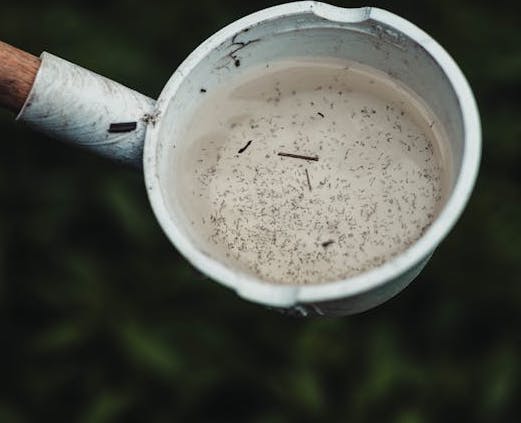Mosquitoes. They’re the uninvited guests who ruin outdoor picnics, backyard barbecues, and summer nights by the pool. Whether it’s that high-pitched buzz near your ear or the inevitable itch that follows their bite, we’ve all felt the sting of these tiny bloodsuckers.
But how long do mosquitoes live, and why does it sometimes feel like they’re always lurking? Let’s dive into the mosquito life cycle and discover just how long we have to deal with these persistent pests.
The Mosquito Life Cycle
To answer the question, “How long do mosquitoes live?” you first need to understand their life cycle. Mosquitoes undergo four stages: egg, larva, pupa, and adult. Their life cycle can range from a week to a few months, depending on environmental conditions.
- Eggs: Female mosquitoes lay their eggs in or near water. Some species can lay up to 300 eggs at a time, and if the conditions are right, these eggs can hatch in just 48 hours.
- Larvae (Wrigglers): Once the eggs hatch, the larvae (often called “wrigglers” because of their movement) emerge. They spend their time in water, feeding on organic material, bacteria, and algae. Depending on temperature and available food, this stage can last from 4 to 14 days.
- Pupae (Tumblers): After the larval stage, mosquitoes become water-bound pupae, and in just a few days, they’re ready to emerge as adults.
- Adults: Finally, the mosquito breaks free from the water, transforms into an adult, and sets off to find food and a mate. For males, their life pretty much ends here. After mating, they live for about 10 days. Females, however, are the ones we typically worry about because they’re the biters.
How Long Do Adult Mosquitoes Live?
How long do mosquitoes live in their adult stage? The answer depends primarily on whether we’re talking about male or female mosquitoes.
Male mosquitoes are short-lived, generally lasting about a week or ten days. Their sole purpose is to mate with females, and once that’s done, they check out. Fortunately, male mosquitoes don’t bite, so their brief existence won’t leave you itching.
Female mosquitoes, however, are the ones responsible for those irritating bites. They can live up to two months under ideal conditions, though their average lifespan is closer to two to three weeks. The reason they live longer is tied directly to their need to feed on blood for reproduction. A blood meal gives them the protein they need to produce eggs.
Once a female mosquito finds a host (that could be you), she takes her blood meal and lays her eggs. After that, she can repeat the cycle, feeding and laying eggs multiple times throughout her life. Under the right conditions—warm, humid environments with plenty of stagnant water to breed in—mosquito populations can skyrocket, making it feel like they’re around forever.
Environmental conditions play a massive role in determining how long mosquitoes stick around, like the following:

- Temperature: Mosquitoes thrive in warm weather. That’s why they’re more active in the spring and summer months. When temperatures dip below 50°F, many species become inactive or die off. However, mosquitoes can live year-round in tropical climates or warm areas, making them a constant pest.
- Humidity: Mosquitoes love moisture. High humidity levels allow them to stay hydrated and extend their lives. This is one reason why mosquitoes are more active after rainfall or near bodies of water. Humidity is essential for egg-laying and helps adults survive longer.
- Water Sources: Female mosquitoes need water to lay their eggs, which is why stagnant water is their breeding ground of choice. Even small amounts of standing water—like what you’d find in a birdbath, clogged gutter, or flower pot—are enough for mosquitoes to multiply. The more water around, the more mosquitoes you’re likely to see.
Why Are Mosquitoes Such a Big Problem?
Beyond just being annoying, mosquitoes can pose serious health risks. Because they feed on blood, mosquitoes are capable of transmitting dangerous diseases such as:
- West Nile virus
- Malaria
- Dengue fever
- Zika virus
The longer a mosquito lives, the greater its chance of picking up and transmitting these diseases. This is one reason why controlling mosquito populations around your home is essential. Minimizing the number of mosquitoes means fewer bites and a reduced risk of illness.
How to Control Mosquitoes

If you’re dealing with an infestation or just trying to keep the mosquito population in check, there are a few things you can do:
- Eliminate Standing Water: Removing breeding sites is the most effective way to reduce mosquito populations. Regularly check for standing water in flower pots, gutters, bird baths, and other containers.
- Keep Your Yard Trimmed: Mosquitoes like to rest in tall grass, so keeping your lawn mowed and trimming shrubs can help reduce the number of mosquitoes in your yard.
- Use Mosquito Repellent: When spending time outdoors, especially during the evening or early morning hours when mosquitoes are most active, use insect repellent to protect yourself from bites.
- Install Screens: Ensure that windows and doors are properly screened to prevent mosquitoes from entering.
Trust proof. Pest Control for Your Mosquito Problems!
When mosquitoes start taking over your yard, sometimes DIY methods aren’t enough. That’s where proof. Pest Control comes in. With our proven techniques, we’ll help you tackle your mosquito problem, no matter how big or small.
So, how long do mosquitoes live? Too long if they’re bothering you! Let proof. Pest Control help reclaim your yard and keep mosquitoes at bay. Contact us today!

